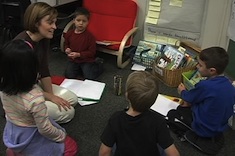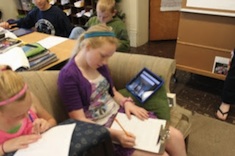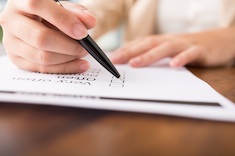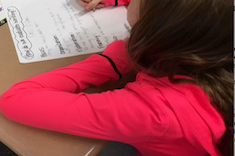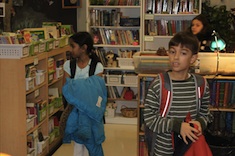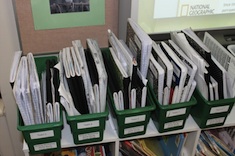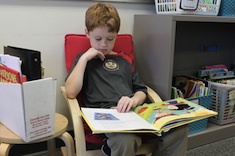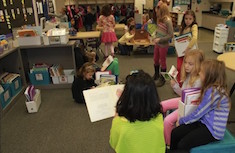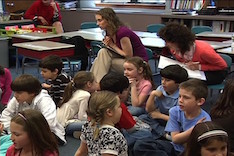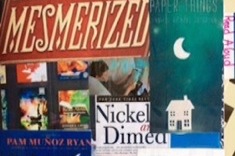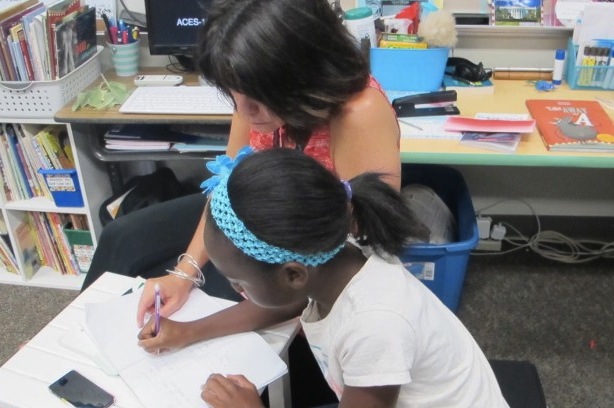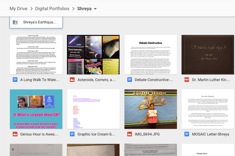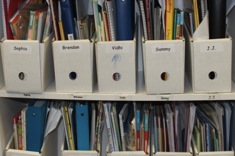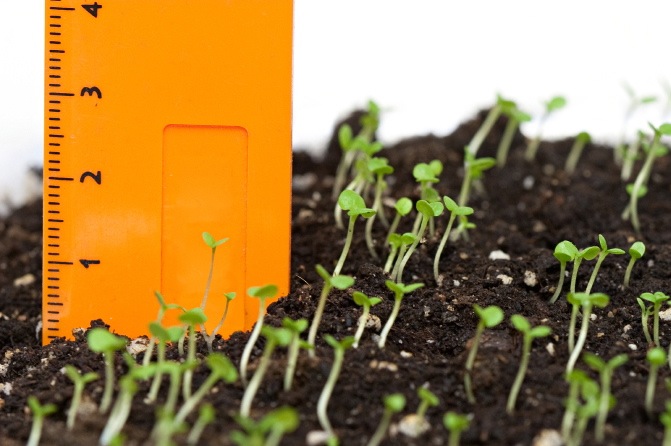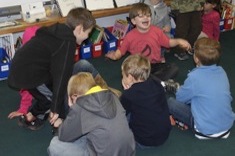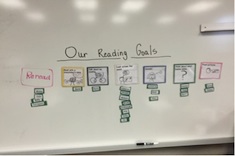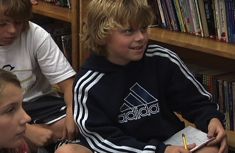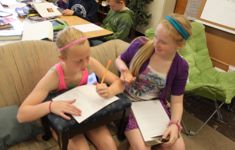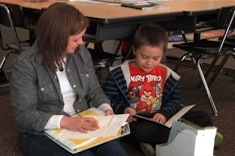Assessment Tools
Making sense of the enormous amount of student data in any classroom or school is probably the biggest challenge we face individually and in our school communities. Here you'll find everything from one-page templates created by teachers for use in their classrooms to videos of staff teams poring over large data sets. We don't have all the answers, but we do provide tools to help you ask better questions as you evaluate students and talk about assessments with your colleagues.
Latest Content
End-of-the-Year Reflection
Melanie Meehan shares a series of thoughtful questions to help students reflect on their process as writers, and what they need as they move into the summer and new classrooms.
Choosing and Refining Student Goals
Katie DiCesare shares the process of having her first graders choose their literacy goals, and her role in helping them refine goals through observation and conferring.
Revising Weekly Reflections
Katherine Sokolowski revises the weekly reflection form her fifth graders use to ensure everyone is tracking goals, progress, and expectations.
Temporary Strategies
Clare Landrigan confers with a student and discovers that a tool designed to help the reader is actually hindering her learning. The experience causes her to reflect on the need for flexibility when matching strategy scaffolds to young readers.
Observations and Test Preparation
Christopher Carlson takes on the role of observer and researcher to analyze his students' needs when it comes to test-taking skills, and enlists students in the process of reflecting on his data to implement new test-taking strategies.
Student Self-Assessment Strategies
Melanie Meehan works with fifth graders to help them create their own set of indicators of success in a writing unit.
Tests of Time
This vivid new poem from Shirley McPhillips, explores the disconnect between exams and life.
What’s a Great Workshop Day?
Mary Lee Hahn considers how the success of any day has to integrate observations from conferring, lessons, and share sessions.
Planning and the Tuesday Effect
Mary Lee Hahn realizes how much a workshop approach has changed her planning process and comfort level with the unexpected.
Getting Creative with Writing Celebrations
A celebration is the pause that refreshes between writing units for many teachers. Melanie Meehan shares suggestions for creative celebrations.
Growing Toward Independence
Cathy Mere shares what to look for and what to try next with young learners who are easily distracted and struggling to concentrate during independent reading.
Alternatives to Home/School Reading Logs
There may be few literacy homework assignments more despised by families than the dreaded reading log. Gigi McAllister proposes some alternatives, and explains how she keeps families in the loop on reading progress.
Core Memories and Gotcha Moments
Jennifer Schwanke explains why pop quizzes can be damaging to students by using a pop culture reference.
Unstable Labels: Stop the Race to Z
Jan Burkins and Kim Yaris consider the insignificance of what levels convey about young readers.
Reading, Engagement, and Kidwatching
Katrina Edwards looked around her first-grade reading workshop one day in winter and it wasn’t a pretty picture. Many students were doing anything but reading. She develops a plan to approach the issue of time on task thoughtfully.
Using Reading Notebook Covers for Reflection and Goal Setting
Clare Landrigan and Tammy Mulligan are using reading notebook covers in ingenious ways.
Data That Matters
What information is gathered by a teacher sitting in a rocking chair quietly watching her students? Christy Rush-Levine discovers it is plenty.
Getting Started with Digital Portfolios
Megan Skogstad shares advice launching digital portfolios.
Launching Student Data Binders
Megan Skogstad shares lots of practical advice for creating and sustaining student data binders.
Growth Lines
Deb Gaby thinks about the importance of baseline information early in the school year.
Setting Goals During Mini-Celebrations
Melanie Meehan recommends linking goal setting to small celebrations as a great way to build community and skills at the same time.
Student Learning Targets
Christy Rush-Levine finds she has to rethink learning targets for her middle school students if she wants students to pursue complex and lifelong reading goals.
Setting Goals with Students
Melanie Meehan shares anchor charts and strategies for goal-setting.
Rethinking Reading Goals
Maria Caplin develops a system for helping students move beyond simple goals like noting the number of pages read.
Weekly Check-In Sheets
Are you finding effort from students is flagging? Katherine Sokolowski develops check-in sheets as a way to lift student energy and reflection.
Digital Status of the Class
Maria Caplin explains how a digital status sheet saves minutes every week that add up to extra hours of instructional time over the year.
Wyatt’s Running Record
Bitsy Parks completes a running record with first grader Wyatt as part of our running record series.
Running Record: Kaenon
Bitsy Parks completes a running record with first grader Kaenon.
Jillian’s Running Record
Bitsy Parks completes a running record with first grader Jillian. This is part of our new running records series.
Running Records: Rationale and Procedure
Bitsy Parks explains her procedures for completing running records in her first-grade classroom. This is the first installment in a video series on running records.
Browse Content By
Type
Category
- Assessment Tools
- Big Fresh Archives
- Booklists
- Choice Numeracy
- Classroom Design
- Common Core
- Community Building
- Conferring
- Content Literacy
- Digital Literacy
- English Language Learners
- Equity
- Family Relations
- Free Samples
- Guiding Groups
- Leadership
- Literacy Coaches
- Mentor Texts
- Minilessons
- New Teacher Mentors
- Podcasts
- Poetry
- Quote Collections
- Reading Strategies
- Self Care
- Struggling and Striving Learners
- Talking and Listening
- Teacher Study Groups
- Teaching Reading
- Teaching Writing
- Word Study and Vocabulary
Author
- Melissa Quimby
- Nawal Qarooni
- Gwen Blumberg
- Julie Cox
- The Lead Learners
- Hannah Tills
- Josie Stewart
- Ruth Metcalfe
- Mallory Messenger
- Becca Burk
- Jodie Bailey
- Vivian Chen
- Mary Brower
- Tiffany Abbott Fuller
- Stephanie Affinito
- Ruth Ayres
- Leigh Anne Eck
- Heather Fisher
- Shari Frost
- Julie Johnson
- Suzy Kaback
- Gigi McAllister
- Shirl McPhillips
- Melanie Meehan
- Cathy Mere
- Debbie Miller
- Tara Barnett and Kate Mills
- Tammy Mulligan
- Dana Murphy
- Bitsy Parks
- David Pittman
- Brenda Power
- Heather Rader
- Matt Renwick
- Mandy Robek
- Christy Rush-Levine
- Gretchen Schroeder
- Jen Schwanke
- Brian Sepe
- Katherine Sokolowski
- Stella Villalba
- Jennifer Vincent
Grade Level
Choice Literacy Membership
Articles
Get full access to all Choice Literacy article content
Videos
Get full access to all Choice Literacy video content
Courses
Access Choice Literacy course curriculum and training


